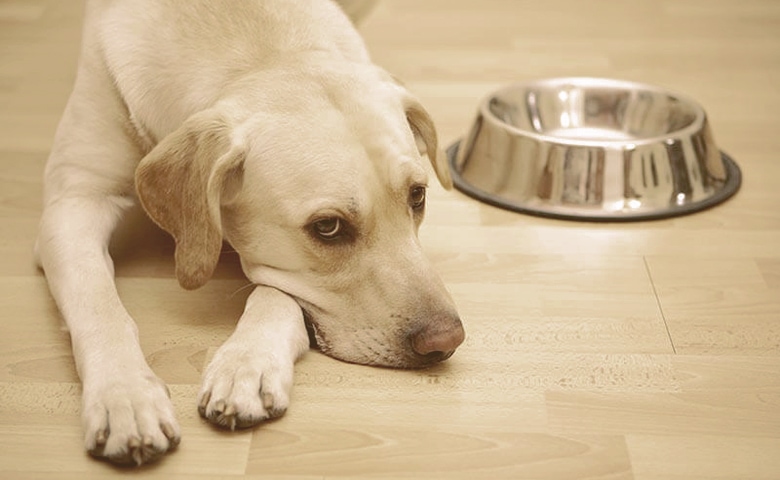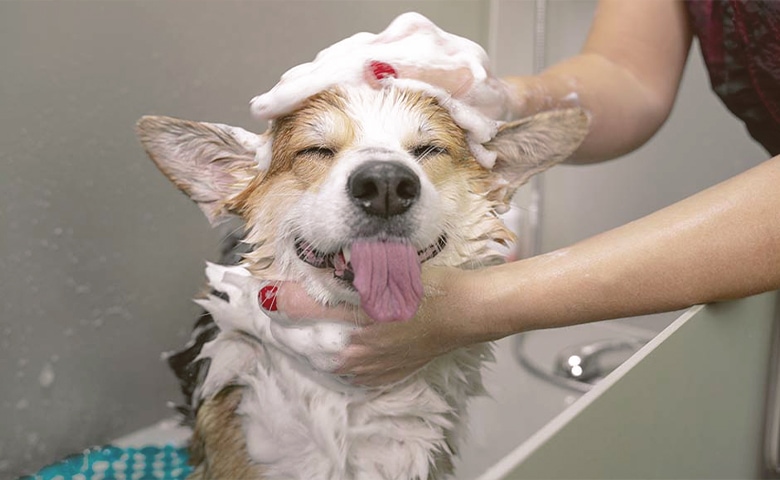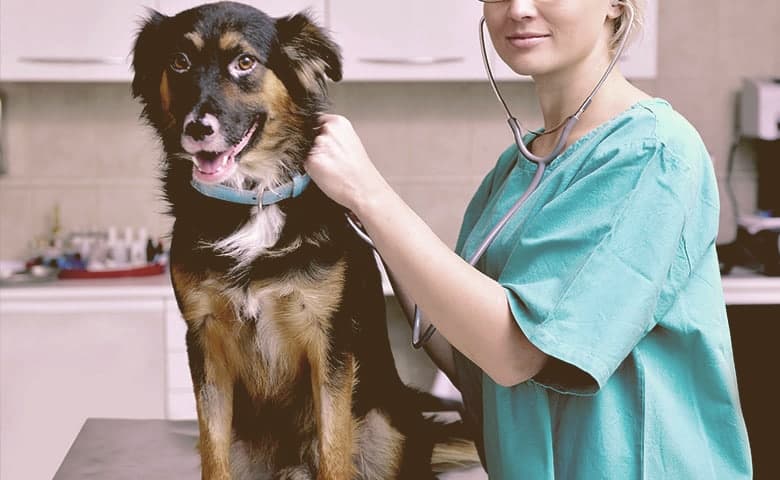
A Guide to Deworming Your Dog Naturally
Alex Vicente • Updated on March 21, 2023
- This review contains affiliate links. Read more here.
- Not a substitute for professional veterinary help.
Almost every dog will be inflicted with the unfortunate situation of having worms in their lifetime.
All dog owners know how important it is to keep their puppy parasite-free to allow them a long, healthy, and comfortable life.
It can be very surprising for owners when they realize how common worms can be in dog populations, so understanding natural remedies and how to keep worms away is valuable knowledge for dog owners.
There are a number of at-home remedies that can be implemented to get rid of unwanted visitors.
In this article, you will learn about how deworming works, what parasites you need to protect your dogs from, and the natural remedies you can implement at home to keep your dog safe.
Table of Contents
What is Deworming?

You may remember the breeder or shelter performing a deworming treatment on your dog before they were passed into your care. Because worms are so common in dogs, veterinarians recommend deworming your dog at around two to three weeks of age as their mother could have easily passed a strand of parasites to your dog. The worms could have been passed before birth or through their milk during infancy.
- Since puppies are so susceptible to issues due to their new and weak immune system, it is important to get rid of all worms before they deal any damage
- This is the initial stage of the deworming process, but it does not stop over the lifetime of your dog
- Dogs can contract worms at any point in their life, so you must always be prepared
Over-the-counter medicines are created to paralyze the worms, which then leads your dog to get rid of them through excretion. It is important to realize that just because something is listed as medicine it does not mean it is completely safe to give to your dog and could possibly make your dog ill or have issues down the road. That is why posing a natural remedy can be so valuable and healthy for your dog.
In this article, you will learn about the types of worms your dog can contract so you understand what causes these issues. Unfortunately, these worms are easier to contract than dog owners would like, but awareness is key to ensure your dog is kept as safe as possible.
Common Worms and Parasites That Affect Dogs

There are six common types of worms, they are all internal parasites that your dog can pick up. If you suspect your dog has one of these types of worms your veterinarian can confirm through a feces or blood sample.
These worms and parasites have distinct features that distinguish them from each other. If you take your dog to new environments, then it is always good to stay aware of any symptoms may be experiencing because of worms or parasites. Keep reading and take a look at the various strands of worms and how they might affect your dog.
Hookworms
Hookworms get their name from the hook-like teeth they use to attach to your dog’s intestinal lining. After attachment, they breed thousands of eggs that get into your dog’s bloodstream. These worms are problematic as they can reproduce quickly and are hard to get rid of. Animals that have a severe infestation like this may become anemic and need aggressive treatment.
- Your dog can pick up hookworms by walking through wet grass or contaminated soil
- Hookworms are passed through dog feces and can survive for a long time in a moist environment
Unfortunately, hookworms can be a cause of death and can also pass to humans. When humans contract hookworms, they will get under the skin and reproduce, so quick action to your dog’s symptoms and strict hygiene is very important.
Tapeworms
Tapeworms are easily spotted as they can grow to be very long, hence the name tapeworm. These worms are usually spotted near your dog’s anus, they are segmented and look like a small grain of rice. They can also be spotted in your dog’s feces if your dog ingests them during self-grooming.
Tapeworms are typically transmitted through fleas, fleas eat the tapeworms and if your dog eats the fleas then the worms will infect your dog. Many dogs do not show symptoms but some develop vomiting or abdominal pain. This is why it is important to keep a regular eye on your dog’s bowel movements to ensure they are healthy and worm-free.
Roundworms
Roundworms are some of the most common parasites that infect dogs, these are most often found in newborn puppies passed from their mother’s milk. Unfortunately, roundworms get into your dog’s intestines and survive by eating their food, which could cause digestive issues and malnutrition.
Adult worms can grow to several inches long and will be expelled in your dog’s feces or may appear in your dog’s vomit. A sign that your dog may have roundworms is if their belly starts to swell, look for these bodily changes and odd eating patterns to see if roundworms have infected your puppy. This is also another parasite that requires a routine check of your dog’s bowel movements.
Heartworms
Heartworms are such a common problem in dogs that veterinarians recommend a monthly prescription to ensure your dog stays protected from these pesky parasites. Heartworms fill your dog’s heart and lungs if left untreated, causing extreme pain and eventually lead to death.
- Heartworms are contracted by mosquitoes, and since mosquitoes are common in certain areas, it is important to keep your heartworm medicine prescription up to date
- Unlike other worms, heartworms can only be detected by a blood test
- If you miss your dosage and notice signs of sickness in your dog, take them to the vet to be checked for heartworms
This is the one parasite that medical treatment is highly recommended, though natural dewormers will aid the efficacy, veterinarians recommend pet owners to not even allow heartworms to enter a dogsbody as the repercussions can be very harmful.
Whipworms
Whipworms are an unfortunate group of parasites as they are hard to diagnose. Unlike other worms who release eggs in large sizes and very consistently, whipworms release a small number of eggs sporadically. And these eggs are very resilient, making them not only hard to find but hard to kill. They are also very small, making them hard to find and diagnose.
If your dog has whipworms they may have excessive diarrhea that is quite smelly and runny. If whipworms are the diagnosis your pet will have to go through a few rounds of treatment to eradicate all of the possible eggs that are dormant.
Protozoans
Protozoans typically do not cause many symptoms, they are single-celled organisms that take residency in your dog’s digestive tract. An issue with protozoans is that they are harmful to humans.
These parasites are contracted through water or greasy soil and will result in runny diarrhea. If your dog stays at a kennel for any reason and comes back with an upset stomach, this may be the cause.
Symptoms of Dogs with Worms

If your dog is ever in a new or uncommon situation, like staying overnight at a kennel or visiting a lake or river, be very aware of the signals they are giving off after returning home.
Though we just want our dogs to have fun, these are easy places for your dog to pick up worms. The new terrain will invite your dog to explore, which means they may stick their nose in an unfortunate place.
Unfortunately, your dog may never show symptoms when they have worms, so it is even more important to regularly give your dog the natural remedies for deworming so they stay safe.
If your dog does show symptoms it will typically be one or a few of the following:
- Diarrhea
- Low energy, not normal mood
- Change in appetite, wanting to eat a lot or not eating at all
- Rapid weight loss
- Bloated belly
- Specks in your dog’s stool that resemble a grain of rice
- The appearance of worms in stool
- Coat appears dull
- Depressed or tired
- Dragging the anus across carpet or rough surface
- Vomiting
- Nausea
If you have already been implementing natural dewormers it is imperative that you consult a vet as there could be other issues. Now we will jump into ways you can deworm your dog at home without the medications that could be harmful to your pet.
Home Remedies for Natural Deworming

It can be very tough to keep worms away from your dog for the extent of their life. As you can see, they can be transmitted from bugs, water, other dogs, and various circumstances we just cannot control.
There are many natural deworming options that can keep your dog free of parasites and ensure your peace of mind. Natural dewormers allow you to safely protect your pet without the risk of medicines that could cause adverse side effects.
Many people have issues with over-the-counter deworming products due to their side effects on animals. So below is a list of natural deworming solutions for you to try. These are all effective and should be used rotationally to keep a potent effect.
Pumpkin Seeds
Pumpkin seeds carry an amino acid called cucurbitacin that is extremely effective in getting rid of parasites. This is a great option because pumpkin is healthy for dogs and can be given to them on a regular basis. It is even great for other things like a runny stool or an upset stomach.
- You can give your dog whole pumpkin seeds or grind them up, this all depends on your dog’s preference
- It is important to ensure that the seeds are natural and not salted or flavored
The recommended dosage is one teaspoon of raw pumpkin seed to every ten pounds in body weight. Add pumpkin seeds to your dog’s food on a regular basis to keep the worms away. Also, many dog food stores have a canned or frozen pumpkins that can be added to their food.
Garlic
Garlic is listed as one of the most potent forms of natural dewormers, it is very effective as parasites detest this vegetable in the digestive tract. So think garlic if you are dealing with roundworms or whipworms.
The only problem with garlic is that many canine authorities list garlic as a toxic food, but this is intended to keep dogs away from large amounts. If you have a smaller dog it may be best to stay away from garlic, but larger breeds can typically handle it.
Garlic can be mixed with your dog’s food after minced, or you may have to coax them with peanut butter or a treat as garlic is not the tastiest food for your dog. The guided amount is one clove for every ten pounds of body weight, but it is advisable to start small, see their reaction and go from there.
Carrots
Not only are carrots full of vitamin A that support your dog’s health and immune system, coarsely chopped carrots can be a defense against worms. When the carrots are digested they scrape the walls of the stomach and gut, ridding any mucus or parasite that is living there.
Carrot’s can be added to your dog’s meal or given as a treat during training. Most dogs truly enjoy carrots so they have no problem scarfing them down. Also, carrots are so beneficial to your dogs there really is not a limit on what you can give them. Obviously, everything should be in moderation but it is okay to give carrots whenever you like.
Pomegranate
Pomegranates are an amazing superfood that carries large amounts of zinc, which has anti-parasitic properties. Pomegranates will work to alleviate the worm issues your dog may have and give them additional nutrients that are valuable for growth and healthy living.
You can mix pomegranate seeds into your dog’s food, if they tend to not enjoy this superfood, mix it with peanut butter and give it to them as a treat.
Cloves
Cloves are typically used to eliminate tapeworms, these leaves have antiparasitic and antibacterial properties.
- Cloves are safe to give on a daily basis at a specific dosage
- You can crush the cloves over your dog’s food
- The recommended dosage is one-fourth a clove for small dogs and half a clove for medium dogs and then a full clove for large dogs
Cloves are easy food you can throw into your dog’s food if you know or suspect your dog is suffering from worms or parasites. One thing to remember is to never give pregnant dog cloves, as it can cause uterine contractions, but any other dog is okay to intake cloves.
Apple Cider Vinegar
Not the tastiest treat in the world, but known as the elixir for many ailments, ACV is a great treatment for killing off worms. This fermented drink increases the alkaline levels in your dog’s intestines making it unbearable for worms and parasites to survive.
It is recommended to add one-fourth to one full teaspoon of ACV to your dog’s water each day depending on their size and water intake. This will not only rid parasites but give them a shinier coat.
Parsley Water
Parsley is a diuretic for dogs, it works to keep their digestive tract flowing effectively. So if parasites are hanging on in your dog’s gut, they usually cannot withstand the effects of parsley water.
- To make this concoction, add one clump of parsley to a quart of boiling water
- Allow it to steep for about ten minutes and then strain into a jar, do not give any of the parsley leaves to your dog
- Make sure to let the water cool before administering to your dog
You can do this as many days in a row as necessary if you believe your dog has worms. Or do this on a weekly basis as a way to prevent worms from attaching in your dog’s digestive tract.
Turmeric
Turmeric has four components to its makeup that help rid your dog of parasites and even repair the digestive lining that may have been destroyed by its inhabitants. Turmeric is an amazing superfood that has anti-inflammatory and antibacterial properties.
Many dogs will not take turmeric outright, so you can mix the powdered form with coconut oil or peanut butter to create a paste that is given to them with their food. It is recommended to give turmeric to your dog with food once a week or as long as they show symptoms of worms.
Chamomile
Chamomile is widely known for being a soothing plant, it can help with bloating and inflammation caused by parasites. It is most effective at getting rid of roundworms and whipworms.
Chamomile works best when given as a tincture that can be bought online or from health food stores. Give your dog a quarter to a half dose per 20 pounds on a daily basis when you notice signs of worms.
Wormwood
Ironically named for getting rid of worms, wormwood is an age-old treatment that has been used to rid humans and animals of parasites for centuries. The only issue with wormwood is that it is a potent substance that may make your pet feel a bit queasy. Even though it will rid any parasite from their body, your dog may not feel well on this treatment.
Wormwood is given with food, you can give a one-half teaspoon per 30 pounds of your dog’s body weight. Wormwood is typically a last resort due to its likelihood of causing sickness but it will rid your dog of worms.
Coconut
Coconut not only will help rid your dog of parasites it has multiple other health benefits, providing nutrients and making your dog’s coat shinier. Dried coconut is known as a vermifuge, which means it can eliminate parasitic creatures from your dog’s body.
- It is not proven that coconut oil is as effective as a means to rid worms, but it could help and does not hurt your dog in the process
- Coconut oil is also a great way to coat some of the other treatments so your dog has an easier time chewing and swallowing
There is also an option that you may see recommended but is not actually good for your dog and can even be harmful. For example, black walnuts are an effective treatment of worms in humans, but walnuts are very toxic to dogs. You may see proponents of natural dewormers recommend black walnuts, but it is not advised by most communities.
Hygiene Habits to Help Protect Your Dog from Worms

Natural deworming is the first place to start to ensure your dog does not contract worms, but you can also implement hygiene habits that will create a safer space for you and your dog.
If you are vigilant about staying clean and feeding them the right nutrients then you will have a happy and healthy dog. Here are our recommended tips on hygiene safety:
Wipe Your Dog’s Paws Off After a Walk
You never know what your dog’s bare feet could have come in contact with and you definitely do not want to drag it into your home. By using a wet cloth to wipe them down you will get rid of any dirt or parasite that could be lingering and protect you and your family.
Wash Your Hands After Touching Your Dog
Though your dog is a part of the family, they still give themselves personal baths and eat feces sometimes. So keep yourself clean by washing your hands after dealing with your dog especially if they have been outside for a long period of time.
Do Not Leave Potty Accidents to Linger
If your dog has a parasite you could be easily exposed if their feces is left around. Wipe down the floor with pet-safe disinfectant and throw away stools in a sealed bag.
When you take your dog on a walk in the neighborhood or on a trail, make sure to bring some bags to pick up any presents your dog leaves behind.
Wash Your Dog’s Bedding
This can be forgotten easily, we wash our own sheets regularly but forget the dog bed which can get pretty gross as well. Use a hot water cycle to disinfect the bed and let it dry before continued use. This will ensure your dog is always in a clean environment.
Get Rid of Old or Dirty Toys
If a toy has been outside or used for an excessive amount of time, it is time for it to go. Toys that are made of fabric can easily carry worm eggs, so if they cannot be washed immediately then replace them.
When taking your dog to new environments or play areas, you should wash any toys you bring to ensure your dog is fully protected.
Regularly Bathe Your Dog
This one seems simple, but time can pass and you realize it has been way too long since your dog has been bathed. Creating a regular bathing schedule that is thorough will ensure you keep them clean and that the worms stay away.
Do Not Mix Belongings
It is important to wash your dog’s bowls separately from your dishes, and not leave the dog near any food you may eat. This could allow worms to spread into your home which would be unfortunate.
Also, do not let your children lay in your dog’s bed or play with their toys, this just increases their safety when it comes to avoiding illnesses. By avoiding cross-contamination you will avoid the issues that could come with worms being transmitted to your family.
Consult Your Veterinarian

Proactively treating your dog for the implications that come with worms is a great way to stay ahead of any problems that could occur and keep your puppy healthy. Home remedies never replace going to a veterinarian and getting an expert opinion though. When visiting the vet, they can perform tests and take blood and stool samples to be able to truly gauge what is going on in your dog’s body.
- If the symptoms your dog is experiencing do not go away after a few weeks after treatment then it is important to see a vet as underlying issues that are more severe could be present
- Home deworming treatments are not always the right fit so you may need medication at the end of the day
If vet costs are worrisome, you could invest in pet insurance to always have that peace of mind that your dog will be okay. Many pet insurance options will reimburse you partially or fully for expenses and medications. It is important to do your research to see what fits your budget and needs as there are many insurances on the market.
Natural treatments do not always work perfectly but now you have the knowledge to experiment and see what works for your pet. Start by trying one or two of the natural deworming options to see how your dog reacts.
By understanding hygienic measures you can take, your family will be less susceptible to catching something you do not want. By preparing your dog to avoid harm and keeping them on a regular deworming schedule, you will make your life a lot easier and save your dog from an uncomfortable and painful experience.
Sources
CanineWeekly – Home Remedies for Deworming Puppies Naturally
PetPartners – Natural Ways to Treat and Prevent Worms


